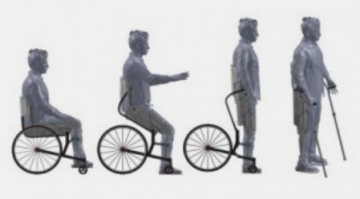
Figure: Adaptive wheeled devices increase autonomy
Jaimie Borisoff’s lab focuses on improving the quality of life of disabled individuals by taking new approaches to home access, recreation, exercise, and mobility devices with user engagement. Bionics, as the interface of man and machine, benefits dramatically from the lessons learned in motility research, which is a more fundamental level of human/machine interfacing.
Mobility impairment is the third most common form of disability in Canada, and a large portion of the mobility impaired population relies on wheeled mobility devices, but classical wheeled devices are limited in their range of autonomy. By incorporating new designs, device-specific restrictions on mobility can be addressed to give the user more autonomy.
M. Khalili, H. F. M. Van der Loos, J. Borisoff, Towards and autonomy-based approach to design and develop mobility assistive technologies for spinal cord injury population 2018, Rehabilitation Engineering and Assistave Technology Society of North America Conference